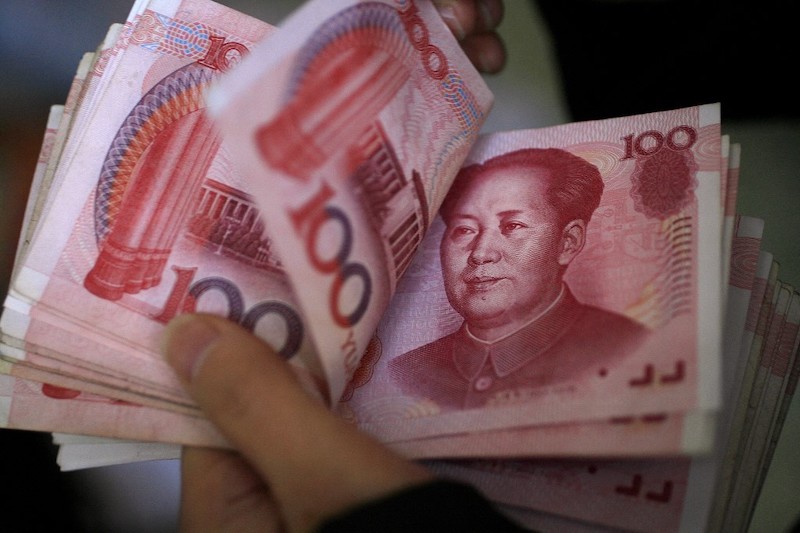Most Asian currencies fell to on Wednesday to their lowest in more than a month, as the dollar firmed after persistently high US inflation data cemented fears of more interest rate hikes by the Federal Reserve.
While the month-on-month change in the headline consumer price index was in line with expectations, the annual rate of 6.4% was above estimates.
Equities also fell in most markets across the region. MSCI’s broadest index of Asia-Pacific shares outside Japan ended down 1.4%, led by drops of more than 1% in Hong Kong and 0.9% in Australia.
The Nikkei in Japan was down 0.4%, while South Korean stocks dropped 1.6% to lead the losses.
The Hang Seng index in Hong Kong fell 1.4%, and blue chips on the mainland also edged down with the Shanghai Composite falling 0.4% as retail investors from Gen-Z to retirees sat on the sidelines.
China’s central bank ramped up its liquidity injections by rolling over maturing policy loans and adding more funds, while keeping the interest rate unchanged.
ALSO SEE: US Senator Wants Review of Ford Deal With China’s CATL
TSMC sale drags Taiwan shares lower
Taiwanese shares were dragged down 1.4% after shares in Taiwan’s TSMC fell more than 3.67% after regulatory filings showed Warren Buffett’s Berkshire Hathaway slashed its stake in the chipmaker.
Berkshire cut its position in Taiwan Semiconductor Manufacturing Co by 86.2% to 8.29 million sponsored American depositary shares, a regulatory filing showed. That comes roughly three months after Berkshire unveiled it bought more than $4.1 billion worth of TSMC stock.
In Australia, the S&P ASX fell 0.9% with mining companies earnings down and the likelihood of more interest rate rises on the horizon.
But things were more positive in India, with the Sensex rising by 0.4% and the Nifty 50 up by close to 0.5%.
Asian currencies knocked down
Asian currencies were hit after Fed officials said on Tuesday the US central bank would need to keep gradually raising interest rates to beat inflation.
Money markets have fully priced in a 25 basis-point (bp) Fed rate hike in March and are almost certain of one more in May.
“The Fed made a mistake by slowing to 25-bp hikes too early. We suggested that this would only elongate the current tightening cycle. It is now more a case of death by a thousand cuts, than the previous scenario of getting hit by a freight train and then having to get back up,” Clifford Bennett, chief economist at ACY Securities, said in a note.
“The extended consistency of Fed rate hikes will wear on consumer, business and investment nerves alike. Further retrenchment of the consumer and business investment is a certainty.”
The Malaysian ringgit fell 0.8% to hit its lowest level since January 9, while the Thai baht shed 0.7% to touch its weakest point since January 12.
The Indian rupee eased 0.2% to hit its lowest level in more than a month.
Singapore facing headwinds
Singapore’s finance minister Lawrence Wong said on Tuesday he expected a slight deficit of 0.1% of GDP for the 2023 budget, which was aimed at helping households manage pressures of rising living costs and reviving the city-state’s pandemic-depleted coffers.
Singapore’s trade-reliant economy faces headwinds this year from slowing global growth, inflation and rising interest rates.
Meanwhile, its expenditures are increasing due to the climbing cost of healthcare, driven by an ageing population.
“Budget 2023 has struck the right balance in addressing immediate needs of households amid rising costs and helping businesses level up their productivity and overall competitiveness,” DBS analysts said in a client note.
“Tighter monetary conditions, high inflation and geopolitical tensions have exerted significant pressure on global demand, weighing down on Singapore’s growth prospects.”
Singapore’s dollar fell 0.4% and equities shed 1.2% to hit their lowest level in nearly a month.
In related news, Indonesian 10-year benchmark yields rose marginally to 6.738% after the country posted a January trade surplus of $3.87 billion, beating forecasts, as exports expanded more than expected, data from the statistics bureau showed.
UK inflation eases, oil down
While Asia had been largely focused on the read-across for global interest rates out of the US consumer inflation data, Europe’s moves were initially dominated by figures showing UK inflation easing to 10.1% from 10.5%.
It pushed the pound back under $1.21 versus the dollar and saw the biggest drop in 10-year UK Gilt yields in almost two weeks, albeit after two sizable rises in bond yields globally in the last few sessions.
Oil prices were dropping again, too, on demand worries, as were banking shares as one of Britain’s biggest lenders, Barclays, saw its shares sink over 8% after it revealed a string of problems.
“Today’s UK inflation data will likely be met with sighs of relief,” Hugh Gimber, a global market strategist at JP Morgan Asset Management, said referring to the Bank of England’s rate setting committee.
Strong wage increase data this week, which posted the 12th consecutive month of stronger than anticipated growth, showed that inflationary pressures remain strong overall, however.
“We see interest rates of 4.5% as the minimum required to return inflation to target over the coming quarters,” Gimber added.
Despite Europe’s resilience, MSCI’s 47-country world share gauge was 0.2% in the red with S&P 500 futures markets also pointing to Wall Street heading 0.3% lower later.
- Reuters with additional editing by Jim Pollard
ALSO SEE:
Air India’s ‘Historic’ $80bn Deal Took Months of Secret Talks
Nissan, Renault to Spend Big in India, as Geely Raises $750m
Tesla to Open US Charging Network to Rivals: White House
























